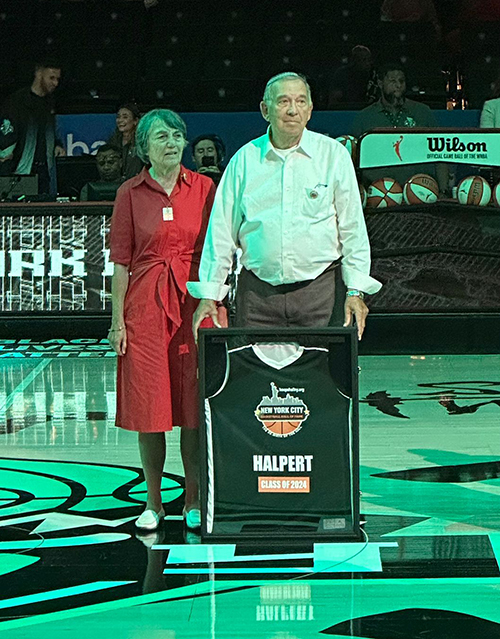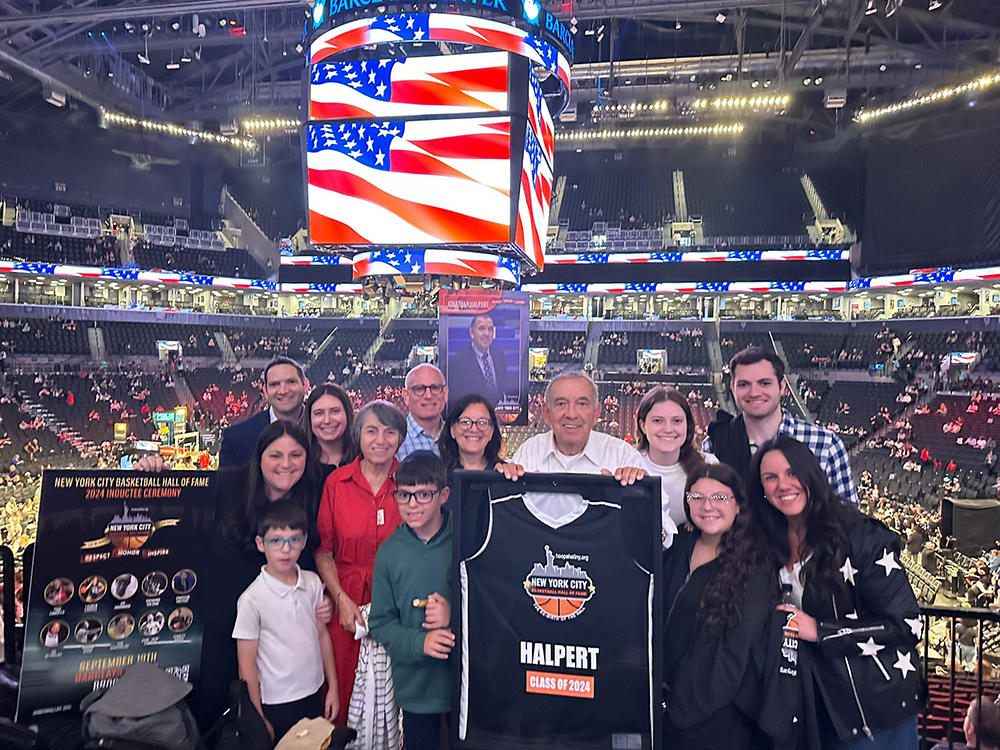
On Sept. 19, Jonathan Halpert, Yeshiva University’s basketball team coach for 41 years, was inducted into the New York City Basketball Hall of Fame. The event took place at the Barclay Center in Brooklyn. The New York City Basketball Hall of Fame was created to honor the outstanding players, coaches, teams, referees and other contributors to the shining historical legacy of basketball in the city of New York.
The New York City Basketball Hall of Fame’s inaugural class was inducted in May 1990. The first class included all-time basketball superstars Kareem Abdul-Jabbar, Billy Cunningham, Coach Arnold “Red” Auerbach, Coach Claire Bee, Bob Cousy, William “Pop” Gates, Connie Hawkins, Coach Dick McGuire, Holcombe Rucker, Adolph Schayes and Zelda Spoelstra.
In his remarks, Halpert thanked his family and YU for giving him the opportunity to coach. “I coached for 41 years, different presidents, different athletic directors, all very supportive even through difficult times.” Halpert also credited his coach and mentor, Red Sarachek. “I played for him from 1962-1966, I learned all my basketball from him,” he said. Halpert also acknowledged his relationship with Lou Carnesecca, who symbolizes New York City basketball. “I also want to thank my players. I was very fortunate to have terrific young men who had very successful basketball careers and very successful careers in general; lawyers, doctors, businessmen, rabbis, teachers, psychologists and some of them basketball coaches. I was fortunate to coach seven father-son combinations. I was fortunate to coach my own kids. It was a great ride, something I’m very proud of.”

Halpert reflected, “I learned how to play basketball in the schoolyard. I started out playing basketball shooting foul shots underhanded until my future high school coach said, ‘Young man, if you want to be a basketball player, you have to learn to shoot overhand.’ To think that a kid from Washington Heights, who shot foul shots underhanded, would be standing here going into the Hall of Fame.”
Halpert added, “Looking at the people who preceded us, the greats of New York City basketball, to think that I am going to be among that group of people is amazing.” Halpert concluded his remarks by expressing, “The greatest memory I have is not only the opportunity to represent where I went to school, where I played, that’s Yeshiva University. Since we were the only Jewish school, I had the opportunity to represent the Jewish people. There is no greater feeling in the world knowing you represent something beyond just yourself. That is the opportunity I had for 41 fabulous, glorious, incredible years, topped off by standing here.”
In an exclusive conversation, Halpert expressed, “I never thought I would be in the New York City Hall of Fame, only the best of the best people of the basketball world are in the Hall of Fame.” Halpert added, “I am very, very proud; it is a statement that you’re really something special. I look at the names who are in here: Red Holzman, who coached the Knickerbockers NBA championship, Rick Pitino, who is now coaching in St John’s, Auerbach, Bob Albert, Willis Reed, Carnesecca, and Kareem Abdul-Jabbar.”
Halpert will be publishing “So You Want to Be A Coach” on the different challenges new coaches face. It will offer three points of advice. “First, decide who you want to be, what is your identity and what you want your team to be. Two, be open and truthful. Communicate with your players, do not tell them what they want to hear, tell them the truth. The third thing is having the courage to fight for the truth, to stand up for your principles that you’re enunciating and be willing to fight for it.” Halpert added, “It’s a lot easier to be named the coach than it is to become a successful coach.”
Reflecting on his career, Halpert described his proudest moment as a coach: “It showed me that I could be a basketball coach while not compromising my religious principles.” For his final away game as coach, YU was playing Saint Joseph’s in Patchogue, Long Island. Patchogue had a history in the 1940s-1980s of being hostile to Jews. Halpert described how in the 1940s they held anti-Jewish rallies. Up until the 1980s, streets were named after German generals. Prior to the game at Saint Joseph’s, their coach approached Halpert and informed him that since it was his final away game, they would play Hatikvah before the game. The opposing coach said, “We are playing it, Johnny, because of how you conduct yourself, what you represented and what your teams always represented.”
Halpert remarked, “At that moment, I said, ‘Wow!’ I really succeeded. It wasn’t just me. It was the kids, the players over the years, who came out there and how they played.”
Judy Berger is The Jewish Link Bronx, Westchester and Connecticut community editor.









